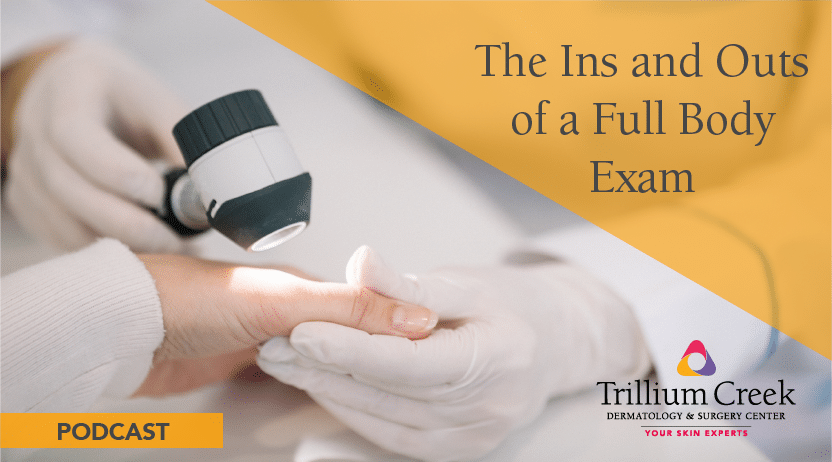
With summer weather around the corner, and winter wardrobes changing to shorts and t-shirts, I often get a lot of questions on full body exams. When should I get them? How often? What should I expect? Do I really need one? Why is this important? In this week’s podcast, I’ll elaborate on why full body exams are so important, what to expect, and how you can stay alert for changes in the skin.
Full Body Skin Examinations (or Preventative Cancer Screenings) are one of the best tools utilized by Dermatologists. These examinations look at the skin in total and assess not only the health of the skin but also look for abnormal lesions.
Many patients ask what is the difference between a Full Body Skin Examination and a Preventative Cancer Screening. The answer is how we treat any skin issues during the exam itself. During a full body exam we can treat all skin conditions or skin lesions that are found at the time of that visit. Preventative Cancer Screenings, on the other hand, are meant to provide a thorough assessment for abnormal moles, pre-cancers, and skin cancers. If any abnormalities are noted during a preventative screening, you will be scheduled to return for a follow-up visit to address those issues at a later date. Sometimes the type of appointment is dependent on how your insurance requests visits be coded. And at times throughout the year, Trillium Creek Dermatology runs special promotions waiving office co-payments for Preventative Cancer Screenings. Visit the Trillium Creek Dermatology website, or sign up for our emails to receive notifications about when these promotions are taking place.
Both full body examinations and preventative cancer screenings are performed in the same manner. The entirety of your skin will be examined, even some often overlooked or difficult to examine areas such as the scalp, groin, buttocks, finger and toe nails, and even between your toes. It is not infrequent that we find a concerning lesion in one of these more inconspicuous areas. If there is an area of skin you would prefer not be examined, please notify us as we strive to make your visit as comfortable as possible. We also encourage you to inform us of any skin lesions that have caught your attention or have caused any symptoms, but rest-assured, we can spot abnormalities even if none have come to your attention.
There is no specific age range for full body skin examinations, we see patients of all ages. We would encourage earlier skin examinations for patients with either a personal or family history of multiple moles (especially if they are of varying sizes, shapes, and colors), a history of abnormal moles, fair complexion and/or an extensive sunburn history or tanning bed use, a history of skin cancers, radiation, immunosuppression or sun sensitive skin diseases. Most patients should have an annual full body examination. If your skin is very healthy with no concerning lesions, we may recommend every other year exams but if there are any issues with abnormal moles, pre-cancerous lesions, or skin cancers, we will recommend skin examinations every 6 months or, rarely, more frequently. No matter when your last full body skin examination was performed, never hesitate to visit us if you note any abnormalities or changes in your skin.
So what can you do at home? Monthly self-skin examinations can help with early detection of skin cancers. Signs to look for include new brown or black spots that look different from other spots, darkening, changing colors, red, or enlarging lesions should be checked. Symptoms such as pain, itching, burning, or bleeding can also signify a problem.
Pre-cancerous lesions, called actinic keratoses, are most frequently noted on the face, scalp, ears, chest, and arms and are typically pink or red, rough spots that are either asymptomatic, or a little sensitive. Skin cancers such as basal cell or squamous cell skin cancers can be pink or red, scaly or smooth spots or bumps. They can enlarge over time and may start to scab, bleed, and be painful.
For all of our full skin examination patients we recommend regular use of sunscreen with an SPF of 50. We have several sunscreen formulations available in the H&H Science Boutique located inside of Trillium Creek Dermatology that contain the natural sunscreen ingredient of zinc oxide and all have an SPF rating of 50. Vitamin B3, also known as nicotinamide or niacinamde, can help reduce the rate of pre-cancers and skin cancers in susceptible patients and can be found in our H&H Science Clear Skin Vitamin. The H&H Science Daily Defense supplement harnesses the natural and powerful antioxidants in Polypodium Leucotomos extract to help preserve your skin’s ability to protect against sun-related effects and aging and can be used in combination with regular sunscreen use to reduce the harmful effects of sun damage.
To schedule an appointment, call us at 330.725.0569.


